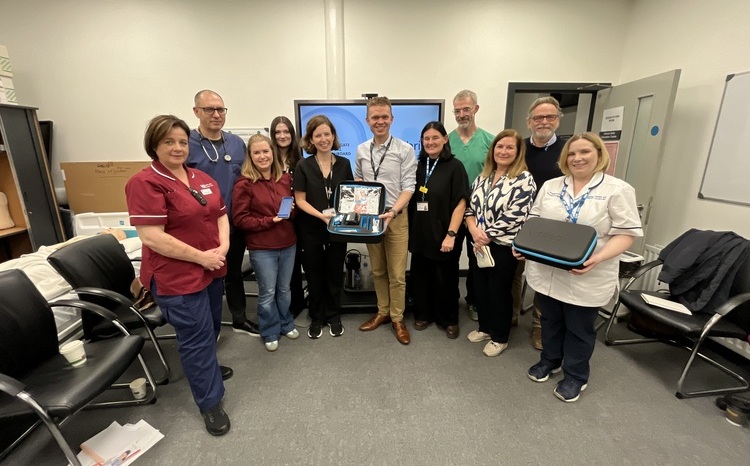Digital Health Coffee Time Briefing ☕
- 16 November 2023

Your morning summary of digital health news, information and events to know about if you want to be “in the know”.
???? News
???? The Feebris AI-guided virtual care platform has received the maximum score of 100 on usability and accessibility in a DTAC assessment conducted by NHS England. Launched in beta in 2020 and officially in February 2021, the Digital Technology Assessment Criteria (DTAC) sets out the national baseline for standards that all digital health and care solutions deployed in the system have to meet, divided into five categories: Clinical safety (pass/fail); Data protection (pass/fail); Technical security (pass/fail); Interoperability (pass/fail); Usability and accessibility (the only scored section). The framework brings together existing legislation and best practice in each of the five categories, being introduced for use by organisations to assess digital health and care tools either during procurement or as part of a due diligence process. The Feebris AI-guided virtual care platform is currently deployed in over 100 Integrated Care System (ICS) sites across the country.
???? Tunstall Healthcare and the University of Edinburgh have signed a Memorandum of Understanding at an event in Edinburgh City Chambers. The partnership aims to accelerate the delivery of innovative solutions in digital care, by facilitating the collaborative exchange of academic and industry expertise to harness the growing potential of data- and AI-led innovations. Under the agreement, the two organisations will work on the development and deployment of digital tools and techniques for telecare. It is anticipated that the range and depth of research conducted through the partnership will also support larger, multi-partner collaborations focused on the development of innovations in digital health.
???? A project to support patients with their hip and knee replacement recovery using wearable technology has been shortlisted for a national innovation award. The Orthopaedic Clinical Research team at the Norfolk and Norwich University Hospital and the University of East Anglia (UEA) Health Economics team have been shortlisted with Dynamic Metrics Ltd for the Collaborate to Innovate Awards. The GaitSmart study ran at NNUH between 2020 and 2022 to develop and test a system to study mobility and improve a patient’s gait after a joint replacement.
????⚕️ Following the success of the groundbreaking Circular Ring Pro, Circular, pioneers of smart ring technology, is excited to unveil the Circular Ring Slim, the thinnest, and lightest, most intuitive smart ring in the world and the first to incorporate haptic navigation and alerts. Paired with Kira+, Circular’s powerful AI wellness assistant, the sleek Circular Ring Slim assesses seven biometrics and 142 derived markers 24/7 to help people sleep better and live healthier lives. By optimising physical activities and maintaining mental wellness it is making personalised, preventative health a reality.
???? Injectsense Inc., a sensor-enabled digital health company, and sister company Injectpower, a developer of ultra-miniature solid-state microbatteries for medical applications, today announced combined funding of $9.4 million to bring highly integrated autonomous implantable devices – smaller than a grain of rice — to production. The implantable sensors, which monitor key indicators over decades, offer a disruptive capability at a time when most diagnostic tools are a mere static snapshot. Physiological markers are typically dynamic and vary widely over a 24-hour period. Such is the case with glaucoma, where intraocular pressure (IOP) is measured in the doctor’s office during daylight hours. Injectsense sensors measure IOP continuously, even during sleep, when pressure can spike significantly and cause vision loss over the long term.
❓ Did you know that?
AI and chatbots like GPT (Generative Pre-trained Transformer) are rapidly evolving and shaping the way we access information. Although these advancements have demonstrated benefits in various areas around health, it is essential to be cautious, particularly when seeking medical advice. This often draws people seeking information on taboo health topics, where societal stigmas or personal discomfort may restrict people from speaking to professionals.
According to a survey by Plan International UK, 700,000 people between the ages of 16-25 rely on AI chatbots for advice on sexual health. It becomes appealing as it is discreet and non-judgemental for sensitive health issues. However, taboo health topics often require complex understanding of people’s experiences and emotions, which AI can struggle to comprehend.
???? What we’re reading
District councils have statutory powers over service areas including planning, housing, benefits, and leisure and green spaces, which affect many of the most significant determinants of health. Around 40 per cent of the population of England live in a district council area. The King’s Fund interviewed district council officers and integrated care board (ICB) staff in four sites from around England to better understanding the current relationships between local government and ICBs, what good practice looks like, what enables it and the outcomes it produces.
???? This week’s events
16 November – “Next steps for Adult social care in England”, Westminster Health Forum policy conference (online)
17 November – Digital Health Networks Debate Series (Online): Why should the NHS be worried about creating EPR monopolies?




